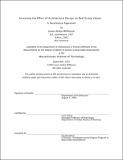Assessing the effect of architectural design on real estate values : a qualitative approach
Author(s)
Millhouse, Jason A. (Jason Arden)
DownloadFull printable version (1.576Mb)
Other Contributors
Massachusetts Institute of Technology. Dept. of Architecture.
Advisor
Lynn Fisher.
Terms of use
Metadata
Show full item recordAbstract
It has long been known that 'good' architecture and quality design are public goods, as they have been shown to increase surrounding property values, create a sense of community, and provide a catalyst for future development. What is less clearly understood is the individual user's demand and willingness to pay for good architecture; if there is a positive externality to quality architecture on the surrounding buildings, tenants, and bystanders, then there must exist a 'socially optimal' level of design that may or may not be equal to the optimal level as measured by the private market. Through interviews with industry leaders and policy makers, and a careful reading of relevant literature, this study seeks to investigate the discrepancy between the socially and privately optimal levels of design, and to determine the degree to which 'good' architects or 'good' architecture can affect private returns to private developers or owners. More simply put: does there exist a private market for 'good' architecture within the market for real estate?
Description
Thesis (S.M.)--Massachusetts Institute of Technology, Dept. of Architecture, 2005. This electronic version was submitted by the student author. The certified thesis is available in the Institute Archives and Special Collections. Includes bibliographical references (leaves 86-88).
Date issued
2005Department
Massachusetts Institute of Technology. Department of ArchitecturePublisher
Massachusetts Institute of Technology
Keywords
Architecture.